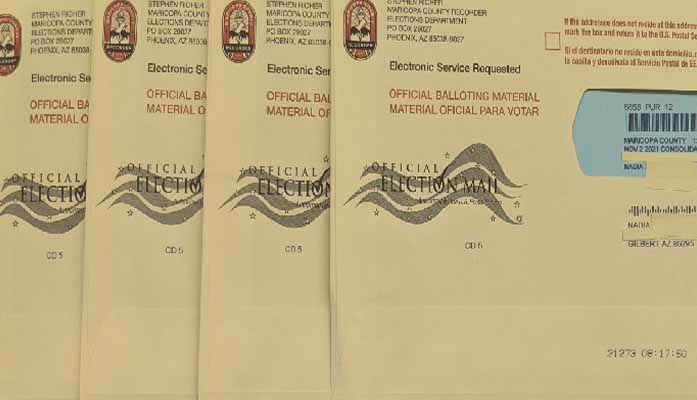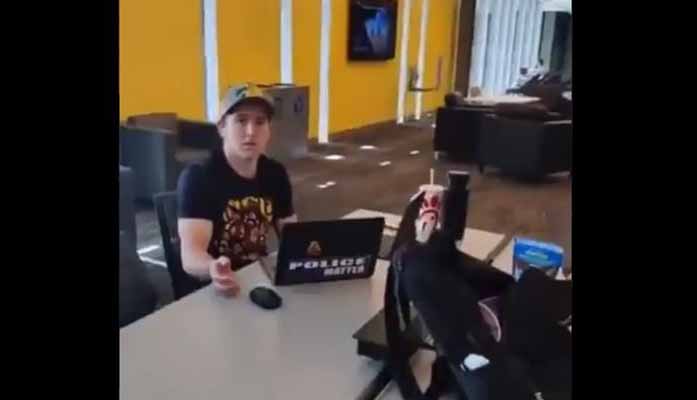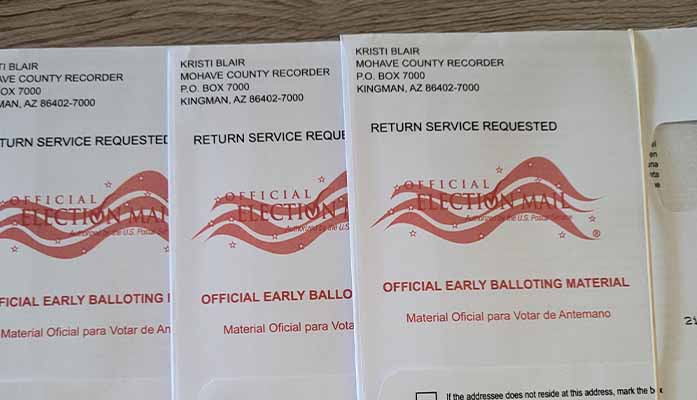
by Corinne Murdock | Oct 13, 2021 | News
By Corinne Murdock |
Several more Arizona voters have come forward to AZ Free News to report they’ve been receiving ballots for voters that should’ve been removed from the rolls years ago – in at least one case, several decades. This report is not to say that this is a widespread issue, but to reflect the fact that AZ Free News has received more reports of this issue from concerned voters.
One voter, Christine Accurso, told AZ Free News that her cousin, Nadia, had moved from her residence to Kuwait a decade ago. Despite her and Nadia both telling Maricopa County for years that Nadia no longer resides in Arizona, the county has continued to send ballots in Nadia’s name to Accurso’s address. Now, Accurso has another ballot for her cousin for Maricopa County’s jurisdictional elections.
The struggles began several years after Maricopa County purportedly removed Nadia from the voter rolls in 2011 at Nadia’s request. As expected, no ballots arrived for Nadia in the 2012 and 2014 election cycles. (However: even if the county had neglected to remove Nadia from their voter rolls initially, Accurso added that Nadia wouldn’t have gotten a mail-in ballot. Nadia had only ever voted in person, and confirmed with Accurso that she’d never signed up for the Permanent Early Voting List (PEVL) or any opt-ins to receive her ballot by mail.)
Then in 2016, Accurso said that she received a mail-in ballot for her cousin. They both contacted the Maricopa County Recorder’s Office. At first, they were relieved to hear from the office that Nadia would be removed immediately. Then 2018 came – and with it, another ballot for Nadia.
“The weirder thing is that we didn’t get [ballots] in 2012 or 2014 – for those other elections we didn’t get one for her. Then all of a sudden in 2016 we got one,” said Accurso. “The thing that bothers me the most is the fact that [Maricopa County has] been told multiple times [to remove her], and we’ve called and confirmed multiple times [that she was removed]. Then this year I got another one. Something is just wrong.”
AZ Free News was also informed that another individual received a ballot in 2020 for her husband, who’d been deceased for 20 years. That was the first year the deceased individual received a ballot, and for some of the family members it reportedly opened up old wounds connected to the loss.
Yet another concerned voter told AZ Free News that she received ballots for her son in 2018 and 2020 – despite the fact that he moved out of the state in 2017. She marked and returned the ballots to Maricopa County election officials both times to indicate that he no longer lived there.
“I haven’t checked [this year] to see if he still hasn’t been taken off of the [registered voter] list,” explained the voter. “I just remember thinking – how easy to cheat!”
Corinne Murdock is a reporter for AZ Free News. Follow her latest on Twitter, or email tips to corinne@azfreenews.com.
*Correction – An earlier version of this article incorrectly listed Accurso’s cousin as her sister.

by Corinne Murdock | Oct 13, 2021 | News
By Corinne Murdock |
 Former Gilbert Mayor Jenn Daniels has encouraged voters to support Gilbert’s $515 million transportation bond – a deal which her lobbying firm, Horizon Strategies AZ, could stand to benefit from greatly. Ballots for the all-mail special election began to be sent out last Wednesday.
Former Gilbert Mayor Jenn Daniels has encouraged voters to support Gilbert’s $515 million transportation bond – a deal which her lobbying firm, Horizon Strategies AZ, could stand to benefit from greatly. Ballots for the all-mail special election began to be sent out last Wednesday.
The former mayor offered her endorsement on a text alert sent to Gilbert voters.
“Gilbert consistently ranks as one of the most desirable places to live because we have always focused on keeping taxes low and quality-of-life investments like safe roads, bike paths and improved technology to keep traffic moving,” read Daniels’ endorsement. “Question 1 is a responsible plan to keep up with growth and maintain our current streets and intersections. Please join me in voting YES on Question 1.”
Daniels’ endorsement was paid for by “Yes for Safe and Efficient Gilbert Roads,” sometimes also marketed as “Yes on Question 1.” The PAC disclosed that they received no funding from out-of-state contributors, and weren’t authorized by any candidate.
AZ Free News reached out to Daniels about her endorsement and potential benefits from the bond. She didn’t respond by press time. Daniels resigned from her position as Gilbert’s mayor last August, citing “personal reasons.” Shortly after, she turned her focus on building up her public relations and lobbying firm.
Former mayoral candidate Matt Nielsen raised concerns about Daniels’ endorsement of the $515 million transportation bond, noting that Horizon Strategies would stand to benefit from it. He told AZ Free News that the whole advocacy movement behind the bond was “really swampy.”
Nielsen also raised questions about Vice Mayor Yung Koprowski’s advocacy to pass the bond. Koprowski co-chairs “Yes for Safe and Efficient Gilbert Roads Committee,” or “Yes on Question 1 Committee” alongside Councilmember Kathy Tilque. The vice mayor also owns a transportation planning and civil engineering firm, Y2K Engineering. On Sunday, Koprowski and Tilque published an opinion piece in Gilbert Sun News urging Gilbert voters to approve the transportation bond. They also published their advocacy in the town’s publicity pamphlet.
“What it is is that the language behind the $515 million dollar bond is so vague that it looks like a blank check for government spending. The $515 million wasn’t a price tag from looking at the needs of the town, saying ‘This is a dollar amount that is needed,’” asserted Nielsen. “It just reeks of backroom deals, bad behavior in government again.”
Two of Horizon Strategies’ key team members were lobbyists in their recent past.
Jessica Pacheco worked as a lobbyist for power giant Arizona Public Service Company (APS) and their parent company, Pinnacle West Capital Corporation from 2010 to 2020, as well as the Arizona Chamber of Commerce from 2007 to 2008 and SunCor Development Company in 2010.
Katie Prendergast also formerly worked as a lobbyist for power giant APS and Pinnacle West Capital Corporation from 2014 until last September. Prendergast’s profile on the state lobbying portal doesn’t include her work as a lobbyist for the Arizona Small Business Association (ASBA).
Additionally, Horizon Strategies recently hired an Arizona State Capitol legislative staffer named Kelsey Jahntz to become their legislative director, as Arizona Daily Independent reported. Jahntz isn’t listed on the state’s lobbying portal, and hasn’t been listed on the Horizon Strategies team member webpage as of press time.
Corinne Murdock is a reporter for AZ Free News. Follow her latest on Twitter, or email tips to corinne@azfreenews.com.

by Corinne Murdock | Oct 12, 2021 | Education, News
By Corinne Murdock |
About two weeks ago, an incident occurred on Arizona State University’s (ASU) Tempe campus in which a group of activist students drove two students out of a study room. The two students happened to be displaying gear that could be construed as more conservative or Republican: a Bass Pro hat, a “Police Lives Matter” sticker, a Chick-fil-A cup, and a “Did Not Vote for Biden” t-shirt. Behind the camera were the activist students – members of the Multicultural Solidarity Coalition (MSC), a group that had been advocating for a multicultural space for years – who essentially wanted to maintain a “safe space” for people of color which they called their “multicultural center.”
AZ Free News looked further into this incident. We discovered several key facts: for one, the “multicultural center” wasn’t established officially at the time of the incident. This was discoverable in subsequent statements and interviews from MSC members involved in the incident.
Additionally, AZ Free News learned that there are several inconsistencies with one of the key activists behind the viral video: graduate student Sarra Tekola.
Multicultural Center Wasn’t Established Officially
In an interview with Civic Cipher about a week after the incident, Tekola asserted multiple times that the two male students “didn’t know what the space was.”
Two of the other female students involved in the incident were also interviewed: Mastaani Qureshi, a history and justice studies undergraduate, alum liaison for the leadership sorority Omega Phi Alpha and co-president of ASU’s Women’s Coalition; and Miriam “Mimi” Araya, a Black Lives Matter (BLM) Phoenix policy minister, vice president of ASU’s Black Graduate Student Association, and doctoral student in justice studies in the School of Social Transformation. The pair concurred with Tekola’s assessment that the two students didn’t know they were in a place designated as a multicultural center.
Tekola also admitted that there were no official staff members, rules, aesthetics, or formal governance associated with the space. She blamed ASU officials for not properly outfitting and identifying the space as a multicultural center.
“This space only just opened up at the beginning of September,” said Tekola. “At that point, [I] became aware [that these students] must’ve not even known what this space is – that’s on ASU, that’s not on them. […] So these students didn’t know what the space was.”
Tekola and her activist group, the Multicultural Solidarity Coalition (MSC) said in their official statement in response to the incident that the multicultural center hadn’t been fully launched.
“We have been working toward this goal [to establish a multicultural center] since 2016 and, as of 2020, we have been coordinating with ASU administrators to establish a multicultural center. The multicultural center is currently housed in one room on campus that was opened this semester and has not yet been fully launched,” wrote MSC. (emphasis added)
Yet, Tekola’s characterization that the space opened up at the beginning of September appears to carry its own inconsistencies. ASU’s newspaper, The State Press, indicated in a September 11 article that the center hadn’t launched. They reported that no further updates were provided in a meeting on the center and other social justice initiatives the day before, though Senior Vice President for Educational Outreach and Student Services James Rund had told the paper in August that the center would be running at some point that semester.
Tekola conflicting herself isn’t out of character for the PhD candidate. It appears that she, Qureshi, and Araya told Civic Cipher that they’d foregone “opportunities to respond via other media outlets.” However, Tekola interviewed with The Arizona Republic on or prior to September 29.
Inconsistencies of that caliber are more frequent than not in Tekola’s life.
Tekola Goes By Multiple Versions of Her Name
This PhD candidate has multiple variations of her first and last name. AZ Free News has found the following name variations associated with this individual: her first name has been cited as Zarra, Sarra, or Zahara, and her last name has been either Teacola or Tekola. At times, Tekola has dropped her last name and gone by “Zarra” only.
According to ASU, her graduate school profile knew her as “Sarra Tekola.” That profile was last archived on Friday. By Monday, the page was removed.
Tekola’s Instagram profile used to be @zebratekola, but she made it private after the incident. Tekola even attempted to claim it wasn’t her, despite screenshots of her original profile and a shoutout linking to her profile from “Scary Movie” film series actress Regina Hall.
Now, Tekola has another Instagram profile called @sarratekola, likely created on Monday judging by the first post on the page. As of press time, her Twitter profile is still active, though it’s now private – @zebra425.
Finally, on her Facebook profile page, @zahara.teacola, and a GoFundMe for her arrest connected with multiple BLM protests, Tekola refers to herself as “Zahara Teacola.” The latest public post on that page occurred April 22, 2020, where she reposted something that’s since been removed claiming that the Kardashians were in blackface. Tekola asked if people decided that the Kardashians’ alleged blackface was okay because they “sleep with black men.”
At times, Tekola has opted to not give her name at all. In May, BLM Phoenix posted an interview of Tekola discussing her arrest last October for obstruction of a public thoroughfare and tampering with physical evidence (CR2020-130075). Those charges were later dismissed without prejudice.
Claims She’s a First-Generation College Student, and Father Was a ‘Climate Change Refugee’
Tekola has claimed repeatedly that she is a first-generation college student, and that her father was a “climate change refugee.” She claims that latter assertion inspires much of her work.
However, as first reported by the Arizona Daily Independent, Tekola is the daughter of Ethiopian refugee Fasil and Susan Tekola. Fasil attended an Ethiopian college prior to fleeing the violent communist revolution of the ’70s. Up until around 2016, Susan was a registered nurse and union member that advocated for socialized medicine. According to the Washington Department of Health, Susan had her credentials suspended in 2016 for “neglecting to respond to charges of being unable to practice with reasonable skill and safety due to concerns related to mental health issues.”
Susan wasn’t Fasil’s first wife – he told The Grist that he married an American woman named Debby to gain citizenship. Prior to their marriage, Debby was an English teacher that he’d met in Kenya and began dating.
The history of Tekola’s parents challenges her previous claims that she is a first-generation college student. Fasil had attended university while in Kenya. It’s likely Susan attended even more college: the state of Washington currently has required all registered nurses to have a bachelor’s degree.
Fasil also wasn’t a “climate refugee” as Tekola has claimed repeatedly. According to The Grist, he fled the violence in Ethiopia, not the drought. Fasil first fled to Nairobi, Kenya, then Israel, then Greece, before reaching Sweden. There, the Swedish government denied Fasil’s asylum application, deporting him back to Kenya. While in Kenya, Fasil studied wildlife range management in college for a year, before taking a job with the United Nations Educational, Scientific, and Cultural Organization (UNESCO).
Before his world was thrown into turmoil, Fasil Tekola lived a comfortable life in Ethiopia’s capital city, Addis Ababa. Born into a wealthy family, his father a colonel, he was one of only a few kids who drove their own cars to school.
The communists rounded up Fasil Fasil and “men of all ages, targeting the educated and wealthy, and gunned them down. Known today as the Red Terror, the genocide claimed more than 10,000 lives in Addis Ababa alone.
Tekola was 19 years old. He and other students were rounded up and jailed. But because his father was a well-known community leader and had left the military in the years preceding the war, he was later released. Two of his friends were not so lucky. After hearing about their murders, Tekola and a friend decided to flee the country.
Their escape began a journey that would send Tekola bouncing across the world in search of asylum. After years of traveling, he’d end up literally a half a world away in Seattle.
Tekola is also far from a victim of oppressive systems and circumstances, claims under which she’s aligned herself in her activism. The PhD candidate grew up in Maple Valley, Washington. According to census information, the median value of a house there from 2015 to 2019 was over $414,000, while median income in 2019 sat over $57,000. As Arizona Daily Independent noted, the median income in Tempe, Arizona, is just over $30,200.
Tekola also claimed in a poem she wrote that she was homeschooled growing up, but said her mother felt she was too naive about the “real world.” Due to that belief, Tekola recounted, her mother placed her in a private Christian school. Tekola said her main contentions with the school were the uniforms, authority figures, mean girls, and how easy the schoolwork was, so her parents put her in a public school.
Here’s what else we could discover about Tekola:
PhD Dissertation Proposes Decolonization as a Climate Change Solution
Tekola’s PhD dissertation suggests that decolonization is a solution for climate change, according to her profile on Academia.
“[Tekola’s] dissertation works on the social side of climate change focusing on creating the cultural change Western society needs to successfully implement climate solutions,” read the profile. “She is investigating the connections between climate change and colonization, and how the colonial trauma Western countries have affects our ability to address climate change today and what we can do to change this dynamic.”
Tekol further suggested on her profile with Happy Lab ASU, a collaborative project of ASU School of Sustainability Students, that the dissolution of Western society would solve climate change:
“My dissertation research focuses on identifying the social causes of climate change as affected by colonization.Specifically, I consider how the colonial mentality still prevalent in Western society, which promotes individualism, consumerism, egotism and hegemony, prevents us from the just transition required to address climate change. I am conducting action research, seeing what happens when Western consumers build relationships of solidarity with the people directly affected by their consumption. Right now we are working with the Black Mesa community who is being displaced from their traditional lands due to coal that is used to pump water to our city. My work is about creating the cultural change needed to successfully implement climate solutions, experimenting with decolonization as a climate solution.”
ASU couldn’t confirm or deny whether Tekola would be finishing her PhD candidacy due to the privacy rights of students, according to ASU spokesman Jerry Gonzalez.
Co-Founded Black Lives Matter Phoenix, Admitted as Ford Foundation Fellow
Tekola co-founded the Phoenix chapter of BLM, and serves as the “co-minister of activism.” Like most of the other BLM protests in the wake of George Floyd’s death, peaceful BLM protests in Phoenix devolved into violence and looting last May. An estimated millions in damage resulted from rioters descending on Scottsdale Fashion Square. BLM Phoenix issued a statement after the riots that they were not involved.
In the past, Tekola’s activism has included her work as an advisor for the Hive Fund, a climate change and gender justice activist organization; a board member for the Rowan Institute, a climate change activist organization; and a director for the Reclaiming STEM Institute, an advocacy organization for diversity in scientific leadership and policy.
Tekola was also the co-founder of Women of Color Speak Out, a group focused on making environmental activism accessible to people of color. That group lasted from 2015 to 2019. According to a pop-up notice that appears on the homepage, the activists parted ways due to ideological differences. None of the founders that AZ Free News contacted responded to our inquiries by press time.
Finally, Tekola was awarded the prestigious far-left Ford Foundation Fellowship in 2018 for a predoctoral expertise in “geography.” Factors considered for a predoctoral fellowship award include the applicant being a minority and focusing their studies or research on diversity and underrepresented communities. The current award sits at $27,000 for three years, exclusive Ford Fellows conference access, and exclusive Ford Fellows networking opportunities.
At the time of press, ASU hasn’t issued any further statements about the incident, or whether any of the students involved will face any penalties.
Corinne Murdock is a reporter for AZ Free News. Follow her latest on Twitter, or email tips to corinne@azfreenews.com.

by Corinne Murdock | Oct 12, 2021 | News
By Corinne Murdock |
Flags will be lowered to half-staff for the fallen La Paz County sergeant, Michael Rudd, on Wednesday.
Rudd’s end-of-watch came Monday, after he was struck head-on by another vehicle while in pursuit of a suspect near the Arizona-California border. Rudd had been promoted to sergeant earlier this year in March.
Governor Doug Ducey issued the announcement later in the day, after Rudd’s passing. Rudd is one of three officers killed over the last few weeks. Maricopa County Deputy Juan Ruiz also died Monday, after being taken off life support following an assault last week. Ruiz was beaten unconscious on Saturday by a felony suspect he was jailing. Flags will be lowered to half-staff on Tuesday for Ruiz.
Last Monday, Drug Enforcement Administration (DEA) Group Supervisor Michael Garbo was killed in a shooting in downtown Tucson.
Ducey noted that since the annual Arizona Peace Officers Memorial Service last month, a total of three law enforcement officers have died: Garbo, Ruiz, and Rudd. The memorial had honored 17 fallen officers.
“Arizona deeply mourns the loss of Sgt. Michael Rudd. For years, he protected the people of La Paz County and made Arizonans’ safety a top priority. I recently honored 17 fallen law enforcement professionals at the Peace Officers Memorial, and it was a sobering reminder of the danger these heroes face every day. Despite the danger, Sgt. Rudd wore the badge and worked hard to keep our communities safe. We will never forget his bravery, and our condolences are with his family, the La Paz County Sheriff’s Office, and the law enforcement community. I’ve ordered flags be lowered to half-staff in honor of his service.”
Corinne Murdock is a reporter for AZ Free News. Follow her latest on Twitter, or email tips to corinne@azfreenews.com.

by Terri Jo Neff | Oct 12, 2021 | News
By Terri Jo Neff |
Since March 2020 it has become easier for federal employees to apply for benefits under the Federal Employees’ Compensation Act (FECA) if they contracted COVID-19 related to their jobs. Now, most federal employees will be able to pursue similar benefits for adverse reactions experienced due to mandatory vaccinations.
According to FECA Bulletin 2022-01, workers’ compensation benefits cover injuries that occur in the performance of duty and generally do not authorize provision of preventive measures such as vaccines and inoculations. But on Sept. 9, President Joe Biden issued an executive order making COVID-19 vaccination a requirement of most federal employment, both new and existing, by Nov. 22.
“As such, employees impacted by this mandate who receive required COVID-19 vaccinations on or after the date of the executive order may be afforded coverage under the FECA for any adverse reactions to the vaccine itself, and for any injuries sustained while obtaining the vaccination,” according to the FECA bulletin dated Oct. 1.
If a FECA claim is received for a COVID-19 vaccination prior to Sept. 9, coverage is afforded “only if the vaccine was administered or sponsored by the employing agency,” the bulletin states.
Biden’s executive order applies to any executive agency that fall under the executive branch of the government (excluding the Government Accountability Office), even if the employee is engaged in telework or works remotely.
Eligibility under FECA benefits will extend to injuries sustained as “the direct result of an employee receiving their mandated vaccination,” such as accidents while commuting to and from a vaccination site, as well as slip and fall injuries occurring at the vaccination site.
Biden’s COVID-19 vaccination mandate allows for limited accommodations for employees who cannot be vaccinated “because of a disability or because of a sincerely held religious belief, practice or observance.” There is currently no FECA coverage for booster vaccinations.
Postal Service employees are not included in the Sept. 9 executive order but are expected to be subject to a vaccination requirement under upcoming temporary orders from the Occupational Safety and Health Administration for companies with 100 or more employees. There has been no announcement as to when OSHA’s rules will be announced or go into effect.
COVID-19 vaccinations are not the only pandemic related claims which FECA deals with.
In March 2020, then-President Donald Trump announced that federal employees who contract COVID-19 through their jobs would be entitled to coverage under FECA. Special case handling considerations were put in place for those engaged in high-risk duties such as members of law enforcement, first responders, and front-line medical and public health personnel. But all other employees were required to provide a factual statement and any available evidence concerning exposure in an attempt to obtain benefits.
Then in October 2020, FECA announced new procedures for approving claims of those employees whose positions were not classified as high-risk but their individual employment circumstances “are the same or similar to the circumstances for high-risk determination by position.”
This was followed in March when Section 4016 of the American Rescue Plan Act of 2021 became law. It relaxed the FECA rules once again, making it easier for most federal employees diagnosed with COVID-19 to file a claim for an injury “proximately caused by employment” if their duties required contact with patients, members of the public, or co-workers, or included a risk of exposure to the virus prior to the diagnosis.
In May, the U.S. Department of Labor announced that any COVID-19 related FECA claims denied or withdrawn prior to March 12 would be eligible for review by the Office of Workers’ Compensation Programs (OWCP) under the new eligibility criteria. The advisory also encouraged anyone who believed they had contracted COVID-19 “as a result of” federal employment to file a FECA claim.

by Corinne Murdock | Oct 11, 2021 | News
By Corinne Murdock |
Voters are reporting on social media that they’ve received multiple ballots with different names at their address. This is not to say that these issues have been widespread, but that there are instances of voters receiving three to four different ballots addressed to different individuals.
One Maricopa County voter, Anthony Massara, told the Arizona Daily Independent that he’s received mail for multiple different voters since 2017, despite notifying the post office that none of the voters lived there. This year, the multiple misaddressed ballots he received were for a special election in Scottsdale.
State Representative Leo Biasiucci (R-Lake Havasu City) tweeted pictures of those ballots after Massara reached out to him.
“So the Arizona Secretary of State and Dems say our elections are secure,” wrote Biasiucci. “Here are 3 ballots showing up to a home in Scottsdale, Arizona that has had the same single owner for 5 years. None of those names below are his.”
The state legislature recently passed a law further refining process for resolving ballots addressed incorrectly. Voters may now check a box on a flawed ballot to reflect that the addressee doesn’t reside at their address, and then mail it back to the U.S. Postal Service (USPS).
Then, USPS should return the ballot to the recorder’s office of the affiliated county. At that point, the county recorder would notify the voter that the address they’d listed was incorrect, and offer them 35 days to respond.
If the voter doesn’t respond after 35 days, their voter file would be marked “inactive” and no early ballots would be mailed to that voter until they update their registration. If the voter doesn’t update their registration after two federal election cycles, then they are removed from the voter rolls.
A Mohave County voter, Sherrie Row, tweeted that her daughter received two ballots in addition to hers.
“Arizona is just handing out ballets. Only one of these people live here. And mine isn’t one of these. My democratic daughter got hers +2,” wrote Row.
The Arizona Senate’s Cyber Ninjas-led audit discovered over 23,300 ballots that were voted on from a prior address, according to their report last month. Maricopa County explained that these numbers likely included those that may have cast a “federal only ballot,” those who recently moved, or those who requested a temporary address.
“EXPLANATION: 1) Military and overseas voters can cast a ‘federal only ballot’ despite living outside the U.S. The address tied to their ballot would be their prior address in AZ. 2) People are allowed to move from one house to another (or even one state to another) in October and November of an election year (yes, shocking!). If the driver’s license address matches the voter registration address, they are still allowed to vote. 3) For the November General Election Maricopa County had 20,933 one-time temporary address requests. In addition, snowbirds and college students tend to have forwarding addresses when they are out of the county. 4) Mail-in ballots are not forwarded to another address.”
Corinne Murdock is a reporter for AZ Free News. Follow her latest on Twitter, or email tips to corinne@azfreenews.com.



 Former Gilbert Mayor Jenn Daniels has encouraged voters to support Gilbert’s $515 million transportation bond – a deal which her lobbying firm, Horizon Strategies AZ, could stand to benefit from greatly. Ballots for the
Former Gilbert Mayor Jenn Daniels has encouraged voters to support Gilbert’s $515 million transportation bond – a deal which her lobbying firm, Horizon Strategies AZ, could stand to benefit from greatly. Ballots for the 


